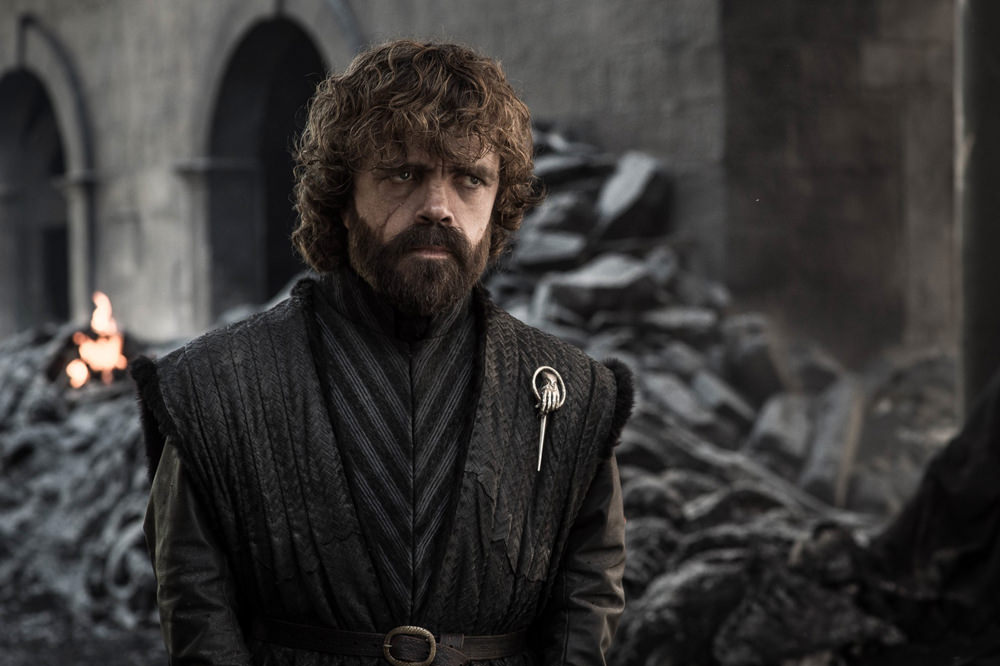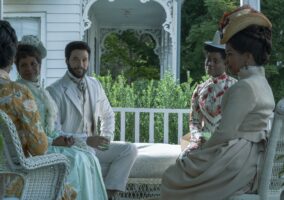
Far be it for us to speak on behalf of Game of Thrones fandom, let alone on behalf of the people of Westeros, but we feel fairly confident that the following sentiment, which we expressed repeatedly last night and continued repeating this morning right up until the moment we hit “publish” on this review, was voiced by so many others in the wake of the story’s end:
Him? Really?
Yes, to the delight of pretty much no one, the one king to rule them all turned out to be Bran “Flake” Stark. It’s a turn that plays well with the story’s themes and sounds on paper like a good, satisfying way of wrapping things up. After all, as Tyrion noted, Bran has one hell of a story behind him. Bran subverts the expected trope of the Hero-King. A vote for Bran is a vote for order and wisdom in ruling. Bran can bridge the past and the future because he lives in the former and can see the latter. Bran Bran he’s our man if he can’t do it no one can. For some reason, Game of Thrones decided at the last minute that the person best suited to sit on the Iron a throne is the person who least wants to do it.
But for real? Him?
We suppose Bran becoming king retroactively explains why the Night King was so obsessed with him. If you’re looking at it from a destiny point of view, it’s worth noting that a LOT of people died protecting Bran. If you’re covering all the bases and trying to come up with the most satisfying ending possible, then making Bran king makes some sort of sense. Jon can’t have it because his judgment is clearly terrible and because the story hinged on the idea that Targaryens are inherently dangerous rulers. Sansa could’ve had it, but then she would have been in the position of expecting the North to bend the knee to her as queen of the seven kingdoms or abandoning the North for what used to be the Iron Throne. Bran had a purpose that remained obscure right up until the last half hour of the series and much like Arya’s assassination of the Night King, it does tend to render his whole arc clearer and more deliberate in retrospect. There’s a certain poetry to the boy who got thrown out the window becoming both omniscient and omnipotent by the story’s end. And yet, despite writers/directors/showrunners D.B. Weiss’ and David Benioff’s somewhat clear intentions to give the viewers the most satisfying wrap-up possible, very little about Bran’s final fate feels particularly satisfying, let alone earned.
But before we could get to the ending, a huge third-act mess needed to be cleaned up. Daenerys Targaryen needed to be put down like a plot inconvenience and most of the first half of this finale was turned over to discussions of why and how it should be done, continuing several discussions that popped up suddenly in the last few episodes as practically everyone around her secretly revealed that they worried about her. While the scenes of her standing Hitler-like before her troops and vowing to continue to break wheels all over the continent were stirringly disturbing and stunningly photographed, everything prior to her assassination felt like killing time until we could get to that part. This rather dreary inevitability followed by the hard left turn of Bran being crowned king gave the entire finale a feeling of perfunctory box-checking. One mad queen down, one to go.
Having said that, Peter Dinklage, Emilia Clarke and Kit Harington pulled out all the acting stops for this one, even if the results weren’t as stirring as they probably hoped. Far too much time was spent on Tyrion weeping over his siblings’ dead bodies, Tyrion making speeches to Jon about the right thing to do and Tyrion pleading with the lords and ladies of Westeros about who should be put in charge. Dinklage sold the hell out of these monologues, but none of them really landed with any weight, largely because it’s hard to pay attention to his speeches without wondering why in the hell anyone would bother listening to him at this point. Clarke and Harington fared a little better, probably because their characters had much more emotional labor to do. Clarke’s bright-eyed optimism in the throne room scene as she recounts to Jon all the wonderful things she’s going to do for the world now that she’s in charge of it was both chilling and a little heartbreaking. Daenerys never felt like she broke bad or crossed a line when she slaughtered King’s Landing. She had the fervor of a True Believer, right up to the end. Jon had the pained realization of a former True Believer who must come to terms with how his own naivete and belief in benevolent tyrants led him to the point where he had no choice but to plunge a dagger into his queen/aunt/lover’s chest. It was an effectively acted and directed scene, which is why it’s a shame it ended with Drogon essentially showing up and screaming “THIS GAME OF THRONES HAS NO WINNER!” The melting of the Iron Throne was a FAR too on-point visual metaphor provided by a dragon having a temper tantrum, making it come off just a little silly and pointless. Oddly enough, despite the darkness of the story and the even darker turn it took before the end, Weiss and Benioff (presumably following author George R.R. Martin’s intentions) went with the closest thing possible to a fairy tale ending. Or more accurately a Tolkien one. Drogon burning the Iron Throne had more than a whiff of Mount Doom to it, as if the throne itself was somehow the problem; rather than the system it represents, much like Tolkien’s manner of embodying evil not in the actions of men but in a piece of jewelry.
And much like Tolkien, once the visual representation of evil was destroyed, happy endings could be handed out to the survivors. Bran became King of the Six Kingdoms, Sansa became Queen of the North, Jon essentially became King of the Wildlings, Arya became Magellan and Brienne got to write “MRS. JAIME LANNISTER” over and over again in her scrapbook (don’t get us started on that). The entire newly formed Small Council in the curiously still intact Red Keep was made up of happy, fulfilled people doing what they do – and love – best. Game of Thrones spent so much time as a pessimistic if not nihilistic kind of show that it feels like a bit of a let down to end on such a relatively happy note. Jon’s exiled to the Night’s Watch, that place where he basically got to do whatever he wanted and entertained a string of visitors while he did it. For some reason, this kept getting offered to the viewer as some sort of sad fate for the character when he said himself just two episodes ago that he’d rather just retire to the wild with Tormund and his people. There was a sense of tragedy in the goodbyes of the Stark siblings (and cousin), that didn’t actually feel earned or true. There’s literally no reason to believe these characters are saying their final goodbyes, even as Arya sails off the map and Jon immediately abandons his watch to go find a redheaded Wildling girl. Sansa’s ending feels correct, as does Arya’s, to a certain extent. Unfortunately, one of the side effects of the show’s rushed storytelling in recent seasons was the shrinking of Westeros to a small continent one could traverse in a day or two. The exiles and permanent goodbyes don’t feel so tragic because these folks were already flung to the far corners of the world once and found their way back to each other.
Still, it’s not the relative happiness of the endings that bugs us; it’s the lingering questions of how we even arrived at such an ending. What was the point of Arya’s journey? Why spend so much time on her during the burning of King’s Landing only to have it amount to … nothing at all. Of course you can’t expect every character to have a major scene in a finale like this one, but we spent so much time with Arya in the last few episodes that it felt like it was heading somewhere. We never saw her use her shape-shifting skills again after she killed the Frey family. We’d have thought they were somehow going to play into the final part of the story, what with they literal years of buildup.
Why did Grey Worm agree to all of this? The two men responsible for his Queen’s death get to live and one of them regains a position of tremendous power and influence? And if he and the Unsullied were sailing for Naath, why even bother exiling Jon at all?
The North just opts out of being part of the seven kingdoms while the other six kingdoms look on passively, not one of them jumping in to suggest that maybe they should all be independent states? It felt very much like the show offering the illusion of an ending without checking to make sure if it made any sense. When you get down to it, why would any of those leaders choose Bran to lead them? He hasn’t distinguished himself in any real way since he came back from his travels. Despite his abilities, he didn’t contribute meaningfully to the battle against the Night King or the battle for King’s Landing. For that matter, why was the entire future of Westeros placed in the shackled hands of Tyrion? Why was anyone listening to him on the subject? In what setting does a man on trial for treason get to start his testimony with “I’ve been doing a lot of thinking” and end it with “… and that’s why everyone should follow my plan?” Why on earth does Tyrion, of all people, get to pick who the next king should be?
Despite the attempt to give us a satisfying ending as close to a happy one as possible, there’s some reason to believe that Game of Thrones ended on the same pessimism that defined it, but you have to look past some of the fan service scenes to see it. Conleth Hill, who played the much-missed-this-week Lord Varys, said in a post-show interview that one of the things he regretted not having a chance to do was play a scene where his character reacts to the news of Littlefinger’s execution by the Stark children. It got us thinking about how much Varys and Littlefinger’s machinations drove the story in the early seasons of the show and how much their influence had sadly diminished by the end of their time in the story. We don’t think it’s a coincidence that the first meeting of the Small council was marked with light comedy and a distinct sense that things had returned to “normal.” In other words, no wheels were broken. The wheel, damaged and scorched a little, remains firmly in place. Note that one of the first orders of business debated (after the supplying of food and the opening of commerce) was the re-opening of the city’s brothels. That’s the real tragedy. Most of the remaining characters (and there were way more them standing at the end than we ever could have predicted) got as close to a happy ending as was possible for them and some of them got outright fairy tale endings, but the world of Westeros spins ever on, still full of great houses and family dynasties; borders and grudges, swords and thrones, ruled over by a king with more true power residing in him than any other king in history, nonchalantly revealing that he’s actively looking for a dragon to control.
There was absolutely no way to end this story in a manner that was going to tie up all its loose ends, play out all its themes and make the majority of the fans happy. In the end, Weiss and Benioff tried to give the viewers most of what they wanted to see while remaining as true as possible to the tenor of the story. Did they succeed? In terms of story points (if not execution of them), they came as close to success as they possibly could have. It’s a good thing that we’re left with questions and frustrations. We wouldn’t have wanted it any other way, even if the nature of these questions and frustrations were not exactly how we pictured them.
The ending of this story is a world that exists somewhere in between the vision of the two characters who worked hardest behind the scenes to shape it; a world of Varys’ dreams, where a sensitive and wise king rules, and a political system straight out of Littlefinger’s playbook that still invites graft, corruption, commerce and deal-making. It’s not so much that anyone truly “won” this game; it’s that the game has no winners or losers because it never truly ends.
One final note of recognition:
Shout-out to costume designer Michele Clapton for doing such an amazing job creating beautiful and story-telling costumes for this show season after season, and tonight, this STUNNING costume for #Sansa #GameOfThrones @CostumeAwards pic.twitter.com/ltlrprKVMr
— Tom & Lorenzo (@tomandlorenzo) May 20, 2019
[Photo Credit: Helen Sloan/HBO]
Friday Leftovers for the Week of May 12th, 2019 Next Post:
Cathy Cambridge Culottes it Up as She Visits the RHS Chelsea Flower Show
Please review our Community Guidelines before posting a comment. Thank you!



